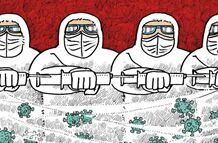人类是如何知道接种疫苗的?
|
疫苗是人类医学史上最伟大的医学成就之一,是医学发展的里程碑。疫苗不仅挽救了数以亿计的生命,更重要的是,它还开启了对抗疾病的新思路——预防。在疫苗出现之前,其他药物和手术都是直接用于治病的,而疫苗开启了预防疾病的新纪元。那么人类是如何知道接种疫苗的? Back in the late 1700s, long before people understood the reason behind immunity, farmers and doctors in rural areas of Britain noticed that dairymaids and other people who got a mild disease called cowpox seldom caught its fearsome cousin, smallpox. Was there a connection?
Some decided there was and inserted material from the cowpox into an incision they cut on the arm of healthy people, thus somehow protecting them from smallpox. In 1798, a doctor named Edward Jenner published the results of his experiments using this procedure, earning himself fame as the “Father of Smallpox Vaccination.” (In truth, we now know that for hundreds and perhaps thousands of years, Chinese healers had been inducing immunity by pushing smallpox scabs into a person’s nose. Some experts now believe that these protective practices—inhaling smallpox virus or pricking the skin—began in Central Asia in the 10th or 11th century.) Note: Scientists later figured out why Jenner was right that cowpox somehow protected one from smallpox. You see, when people caught cowpox, their bodies made special cells called antibodies. They fought the disease. That’s not all. They lingered in the blood in case the disease ever returned. Because cowpox and smallpox are fairly similar, if a person was later exposed to the more serious disease, anti-bodies were ready to fight it too. That knowledge helped scientists develop vaccines. The term vaccination was coined from the Latin for cow (vacca). They contain small doses of weakened, dead or modified viruses. Injected into the blood, they trick the immune system into making antibodies. If the body ever encounters those same viruses, even at full strength, the antibodies make short work of them. Note: The injected polio vaccine, for example, is a killed, intact virus; the oral vaccine is a live, weakened virus. Vaccines for measles, mumps, chickenpox (Varicella), and rubella (German Mea-sles) are live, weakened viruses. Vaccination prior to exposure to the virus is ideal. But a vaccination given within three days of exposure will completely prevent or significantly modify smallpox in the majority of people and given within the first four to seven days will likely offer some protection or alter the severity of the disease. |









